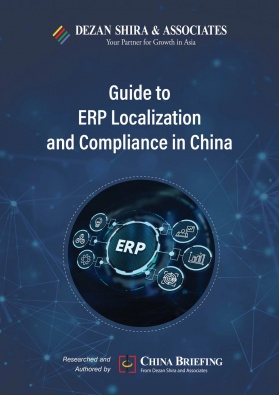China Issues New Fair Competition Review Regulations in Effort to Improve the Business Environment
New China fair competition review rules seek to improve the business environment and break down local protectionism by prohibiting authorities from including discriminatory provisions when drafting local policies and regulations. Under the rules, local policy measures cannot include content that could restrict market access or the free flow of goods, or adversely impact production costs or business activity. However, certain exemptions provide potential cover for local governments to pass discriminatory measures nonetheless. We discuss the impact of the rules on businesses in China.
On June 6, 2024, the State Council released the final version of the Fair Competition Review Regulations (the “regulations), in an effort to “unify the domestic environment” and level the playing field between state-owned and private companies.
The regulations, which are based on China’s Anti-Monopoly Law, will require administrative authorities to conduct fair competition reviews when drafting laws, administrative regulations, local regulations, rules, normative documents, and policy measures (hereinafter collectively referred to as policy measures), to ensure that they do not unfairly favor certain market entities.
The new regulations will come into effect on August 1, 2024.
Fair competition review standards
The regulations prohibit drafting authorities from including any content in policy measures that may negatively impact market access, the free flow of goods and resources, production and business costs, or production and business activities. Policy measures found to contain any such content during the review process (or that do not qualify for the exemptions, see below) will not be issued.
Specifically, the following content that may directly or indirectly restrict market access and exit cannot be included:
- Illegally setting approval procedures for industries, fields, businesses, and other areas, outside the negative list for market access;
- Illegally setting or granting franchise rights;
- Restricting the business, purchase, or use of goods or services provided by specific operators;
- Setting unreasonable or discriminatory conditions for market entry or exit; or
- Other content that directly or indirectly restricts market access and exit.
They also cannot include the following content that may restrict the free flow of goods and resources:
- Restricting the entry of non-local or imported goods and resources into the local market or hindering local operators from moving out, or goods and resources from being exported;
- Excluding, restricting, forcing, or indirectly forcing non-local operators to invest or set up branches locally;
- Excluding, restricting, or indirectly restricting non-local operators from participating in local government procurement and bidding;
- Setting discriminatory fees, standards, prices, or subsidies for non-local or imported goods and resources;
- Setting discriminatory requirements for non-local operators in terms of qualification standards, regulatory enforcement, and so on; and
- Other content that restricts the free flow of goods and factors.
Without a legal or administrative regulatory basis or State Council approval, they also cannot include the following content that affects production and business costs:
- Granting tax incentives to specific operators;
- Granting selective or differential fiscal rewards or subsidies to specific operators;
- Granting specific operators preferential treatment in obtaining resources, administrative fees, government funds, social insurance fees, and so on; and
- Other content that could affect production and business costs.
Finally, they cannot include any of the following content that affects production and business activities:
- Forcing or indirectly forcing operators to engage in monopolistic behavior or providing convenience for such behavior;
- Setting government-guided prices or government-set prices beyond legal limits, providing preferential prices for specific operators;
- Illegally intervening in the price levels of goods and factors regulated by the market; and
- Other content that could affect production and business activities.
Exemptions
The regulations provide exemptions in which the authorities are permitted to include content that could be deemed to restrict competition in policy measures. However, to do so, there must be no alternative plan that has a less negative impact on fair competition, and the authorities must determine a reasonable implementation period or termination conditions.
Specifically, authorities can still include restrictive content in the following scenarios:
- To safeguard national security and development interests;
- To promote scientific and technological progress and enhance national innovation capabilities;
- To achieve social public interests such as energy conservation, environmental protection, and disaster relief; and
- Other circumstances as stipulated by laws and administrative regulations.
If authorities wish to employ these exemptions when drafting policy measures, they must also provide a detailed explanation of the circumstances for the fair competition review.
Review procedures
Under the regulations, policy measures must undergo a fair competition review by a relevant government authority. Which government authority is responsible for carrying out the review depends on which unit drafted the law in question:
- Policy measures issued by government departments must undergo fair competition review by the drafting unit during the drafting stage.
- Policy measures jointly issued by multiple departments shall undergo fair competition review by the lead drafting unit during the drafting stage.
- Policy measures issued by the people’s governments at the county level or above, or submitted to the people’s congresses or their standing committees at the same level for deliberation, must first undergo a preliminary review by the drafting authority and then be submitted to the market regulation department for review.
Authorities conducting the reviews are also required to seek the opinions of relevant operators, industry associations, chambers of commerce, and other stakeholders on the potential impact of the policy measures on fair competition. If the interests of the general public are involved, they must also seek opinions from the public.
The State Administration of Market Regulation (SAMR) is responsible for overseeing the fair competition review system and supervising the relevant authorities in carrying out reviews.
The potential impact on China’s business environment
The new regulations ostensibly address issues surrounding fair competition for private companies, by explicitly prohibiting certain types of anti-competitive clauses from being stipulated in local laws and regulations. Foreign companies in particular have long had concerns over equal access to government bidding and market access to certain industries.
The central Chinese government has been striving to improve the business environment in China for private companies, issuing a series of measures aimed specifically at foreign companies. Some municipal and regional governments have also issued similar plans to boost the local business environment, including Shanghai and the Greater Bay Area. These measures invariably include commitments to expand market access and ensure equal access to foreign companies in government bidding processes.
The new regulations form part of China’s long-term efforts to establish a “national unified market”, an initiative that seeks to break down local protectionism and market segmentation by standardizing rules and regulations across different regions.
Local protectionism has been a major issue in China in the past, as growth incentives have led provincial and municipal governments to favor local companies in areas such as government incentives, procurement, and market access. Ensuring fair competition has been a crucial part of the national unified market push, and as a result, the central government has been building its fair competition review system since 2021.
While the new regulations address some of the issues faced by foreign and non-local companies, the clauses on exceptions provide a significant amount of leeway for local governments to pass discriminatory laws, if they can provide evidence that they are in the service of national security or certain technological, economic, or social benefits. In particular, the clauses that allow anti-competitive policy measures to be passed in order to promote scientific and technological progress and enhance national innovation capabilities, or for the interest of energy conservation or environmental protection, could create conflicting incentives for local governments.
The exceptions may also make it difficult for foreign or non-local companies to contest proposed policy measures, as a local drafting authority can use the relative ambiguity of the language to its advantage when arguing for anti-competitive clauses.
Meanwhile, the restrictions on local governments from offering preferential treatments, such as tax incentives or subsidies, without proper legal or administrative approval can significantly impact foreign investors. Foreign investors must be vigilant during negotiations with local governments, understanding that any promises of special tax breaks, subsidies, or other financial incentives may not hold up if they violate fair competition regulations. This regulatory environment aims to create a level playing field but may introduce uncertainty for companies who seek these advantages as part of their investment strategy.
Foreign investors should therefore ensure that all agreements comply with national regulations to avoid potential nullification, thereby affecting their financial planning and long-term business strategies.
About Us
China Briefing is one of five regional Asia Briefing publications, supported by Dezan Shira & Associates. For a complimentary subscription to China Briefing’s content products, please click here.
Dezan Shira & Associates assists foreign investors into China and has done so since 1992 through offices in Beijing, Tianjin, Dalian, Qingdao, Shanghai, Hangzhou, Ningbo, Suzhou, Guangzhou, Haikou, Zhongshan, Shenzhen, and Hong Kong. We also have offices in Vietnam, Indonesia, Singapore, United States, Germany, Italy, India, and Dubai (UAE) and partner firms assisting foreign investors in The Philippines, Malaysia, Thailand, Bangladesh, and Australia. For assistance in China, please contact the firm at china@dezshira.com or visit our website at www.dezshira.com.
- Previous Article China Releases ESG Reporting Standards for Businesses
- Next Article Maternity Leave in China: A Complete Guide


























